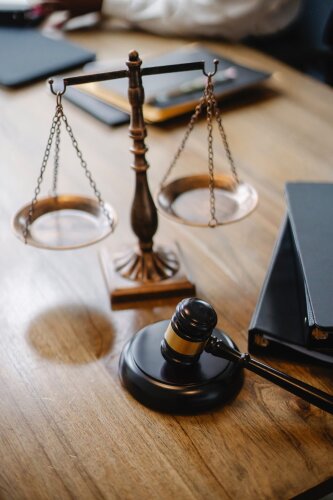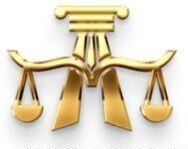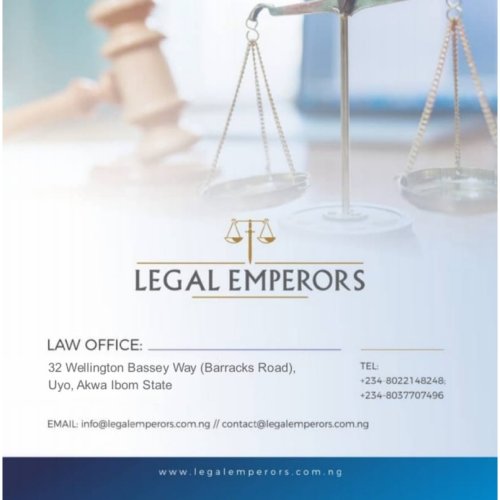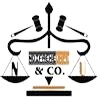Best Conveyancing Lawyers in Uyo
Share your needs with us, get contacted by law firms.
Free. Takes 2 min.
Free Guide to Hiring a Real Estate Lawyer
List of the best lawyers in Uyo, Nigeria
About Conveyancing Law in Uyo, Nigeria
Conveyancing is the legal process of transferring ownership of property from one person to another. In Uyo, Akwa Ibom State, Nigeria, the conveyancing process involves several steps and legal documentation to ensure that property transactions are valid, secure, and compliant with local laws. This process includes verification of ownership, drafting and execution of purchase agreements, registration of title documents, and payment of necessary taxes and fees. Conveyancing is essential whether you are buying, selling, donating, or mortgaging property within Uyo.
Why You May Need a Lawyer
Many individuals seek the help of a lawyer when dealing with conveyancing matters in Uyo due to the complexity and legal risks involved. Some common situations where legal assistance is highly recommended include:
- Purchasing or selling land, residential or commercial properties
- Transferring inherited property or processing probate matters
- Drafting and reviewing property sale agreements or deeds
- Registering property titles with the Akwa Ibom State Land Registry
- Handling disputes relating to property boundaries, encumbrances, or title defects
- Processing mortgages or other charges over property
- Ensuring compliance with local planning, zoning, and land use regulations
A qualified lawyer can provide guidance through the legal requirements, detect any irregularities with property titles, safeguard your interests, and help avoid costly mistakes.
Local Laws Overview
Conveyancing in Uyo is governed by a combination of federal and state laws. These include the Nigerian Land Use Act, the Akwa Ibom State Land Instruments Registration Law, and various local regulations. Some key aspects to be aware of are:
- Land Use Act: All land in urban areas of Nigeria is vested in the Governor of each state, including Akwa Ibom State, who grants Certificates of Occupancy (C of O) to applicants.
- Governor’s Consent: Any subsequent transfer or mortgage of an interest in land requires the consent of the Governor to be valid.
- Title Registration: Property titles and conveyancing documents must be registered at the Land Registry to be recognized legally.
- Payment of Fees and Taxes: Buyers and sellers are required to pay various statutory fees such as stamp duties, consent fees, and registration charges.
- Due Diligence: Verifying the authenticity of property documents and checking for encumbrances or litigations is essential before completing any transaction.
Frequently Asked Questions
What is the first step in buying property in Uyo?
The first step is to conduct due diligence, which involves verifying the owner’s title documents, checking for any government acquisition, and ensuring there are no legal disputes on the property.
Is it compulsory to use a lawyer when handling conveyancing in Uyo?
While not legally compulsory, it is highly advisable to use a lawyer due to the complexities and legal requirements involved in property transactions in Uyo.
How can I verify a property’s title in Uyo?
You can verify property titles by conducting a search at the Akwa Ibom State Land Registry, or by engaging a lawyer to assist with the process.
What is the Governor’s Consent in property transfer?
Governor’s Consent is the approval from the State Governor required for any subsequent transfer, mortgage, or lease of land or property in urban areas, as mandated by the Land Use Act.
How long does conveyancing take in Uyo?
The timeframe varies depending on factors such as document availability and government processing, but typically ranges from a few weeks to several months.
What are common pitfalls to avoid in property transactions?
Common pitfalls include dealing with unverified sellers, accepting incomplete documentation, not verifying land status at the registry, and failing to obtain Governor’s Consent.
Who is responsible for paying fees and taxes in conveyancing?
Usually, both parties share responsibility: buyers often pay registration and consent fees, while stamp duties and legal fees may be negotiated between buyer and seller.
Can I buy land in Uyo as a foreigner?
Foreigners can own property in Nigeria, but the process often requires additional approvals, and it is essential to consult a lawyer familiar with such transactions.
What documents are needed for registration?
Essential documents include the original title documents, purchase agreement, application for Governor’s Consent, identification documents, and evidence of payment of all required fees.
What happens if there is a dispute after purchasing property?
Disputes can be resolved through negotiation, mediation, or by seeking legal redress in the courts. Having a lawyer increases your chances of successful resolution.
Additional Resources
For further information and support regarding conveyancing in Uyo, consider reaching out to the following organizations and offices:
- Akwa Ibom State Ministry of Lands and Housing
- Akwa Ibom State Land Registry
- Nigerian Bar Association, Uyo Branch
- Corporate Affairs Commission Office (for company property transactions)
- Registered surveyors and valuers in Uyo
Next Steps
If you need legal assistance for conveyancing in Uyo, start by gathering all available property documents and identifying your goals for the transaction. Contact a registered legal practitioner who specializes in real estate matters as early as possible to help you navigate due diligence, documentation, and registration. Always verify your lawyer’s credentials and ensure that they are familiar with current local laws and procedures. Taking these steps can protect your investment and give you peace of mind throughout the property transaction process.
Lawzana helps you find the best lawyers and law firms in Uyo through a curated and pre-screened list of qualified legal professionals. Our platform offers rankings and detailed profiles of attorneys and law firms, allowing you to compare based on practice areas, including Conveyancing, experience, and client feedback.
Each profile includes a description of the firm's areas of practice, client reviews, team members and partners, year of establishment, spoken languages, office locations, contact information, social media presence, and any published articles or resources. Most firms on our platform speak English and are experienced in both local and international legal matters.
Get a quote from top-rated law firms in Uyo, Nigeria — quickly, securely, and without unnecessary hassle.
Disclaimer:
The information provided on this page is for general informational purposes only and does not constitute legal advice. While we strive to ensure the accuracy and relevance of the content, legal information may change over time, and interpretations of the law can vary. You should always consult with a qualified legal professional for advice specific to your situation.
We disclaim all liability for actions taken or not taken based on the content of this page. If you believe any information is incorrect or outdated, please contact us, and we will review and update it where appropriate.












